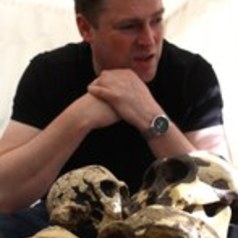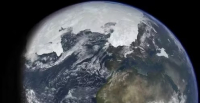
Mark Maslin
Professor of Earth System Science, UCL
Mark Maslin FRGS is a Professor of Physical Geography at University College London. He is a Royal Society Industrial Fellowship and Founding Director of Rezatec Ltd. He is science advisor to the Global Cool Foundation, Climatecom Strategies, Sopra-Steria, and Carbon Sense Ltd. He is member of Cheltenham Science Festival Advisory Committee. Maslin is a leading scientist with particular expertise in past global and regional climatic change and has publish over 150 papers in journals such as Science, Nature, Nature Climate Change, The Lancet and Geology. He has been awarded research council, charity and Government grants of over £40 million. His areas of scientific expertise include causes of past and future global climate change and its effects on the global carbon cycle, biodiversity, rainforests and human evolution. He also works on monitoring land carbon sinks using remote sensing and ecological models and international and national climate change policies.
Professor Maslin has presented over 45 public talks over the last three years including UK Space conference, Oxford, Cambridge, Leeds, RGS, Tate Modern, Frontline Club, Fink Club, Royal Society of Medicine, British Museum, Natural History Museum, The Baker Institute, Goldman Sachs and the Norwegian Government. He has supervised 10 Research fellows, 15 PhD students and 25 MSc students. He has also have written 8 popular books, over 30 popular articles (e.g., for New Scientist, The Times, Independent and Guardian), appeared on radio and television (including Timeteam, Newsnight, Dispatches, Horizon, The Today Programme, Material World, BBC News, Channel 5 News, and Sky News). His latest popular book is the high successful Oxford University Press “Climate Change: A Very Short Introduction” the third edition was published in 2014 and has sold over 45,000 copies. Maslin was also a co-author of the 2009 Lancet report ‘Managing the health effects of climate change’. He was included in Who’s Who for the first time in 2009 and was granted a Royal Society Wolfson Research Merit Award for the study of early human evolution in East Africa in 2011. He is currently the Director of the London NERC Doctoral Training Partnership.

The UK’s £22 billion bet on carbon capture will lock in fossil fuels for decades
Oct 08, 2024 16:45 pm UTC| Insights & Views Politics
The UK government has announced it will invest almost 22 billion in carbon capture and storage (CCS) projects over the next 25 years. The technology works by capturing CO₂ as it is being emitted by a power plant or another...

The Atlantic Gulf Stream was unexpectedly strong during the last ice age – new study
Jul 11, 2024 07:57 am UTC| Nature
Twenty thousand years ago the world was locked into a great ice age. Ice sheets two miles thick covered much of North America, Scandinavia and the British Isles. Greenhouse gas concentrations were much lower, the world...

Feb 20, 2024 11:06 am UTC| Nature
Soils around the world are running low on potassium, a key nutrient needed for plants to grow. This ultimately means we may not be able to grow enough food for everyone. But its not too late: we have just published...
Why are people still flying to climate conferences by private jet?
Dec 05, 2023 09:21 am UTC| Insights & Views
Rishi Sunak, David Cameron and King Charles are just three of the more than 70,000 delegates from nearly 200 countries at the latest UN climate summit in Dubai, COP28. But they are among hundreds who will have travelled...
The five corrupt pillars of climate change denial
Dec 01, 2019 03:22 am UTC| Insights & Views Business
The fossil fuel industry, political lobbyists, media moguls and individuals have spent the past 30 years sowing doubt about the reality of climate change - where none exists. The latest estimate is that the worlds five...
We've declared a climate emergency – here's what universal basic income could do to help the planet
May 20, 2019 22:28 pm UTC| Insights & Views Nature
Governments around the world are declaring climate and environmental emergencies to highlight the unsustainable ways in which humans, over a few generations, have transformed the planet. Weve made enough concrete to...
Anthropocene vs Meghalayan: why geologists are fighting over whether humans are a force of nature
Aug 13, 2018 15:16 pm UTC| Insights & Views
The Earth discovered it was living in a new slice of time called the Meghalayan Age in July 2018. But the announcement by the International Union of Geological Sciences (IUGS) confused and angered scientists all around the...
- Market Data









































